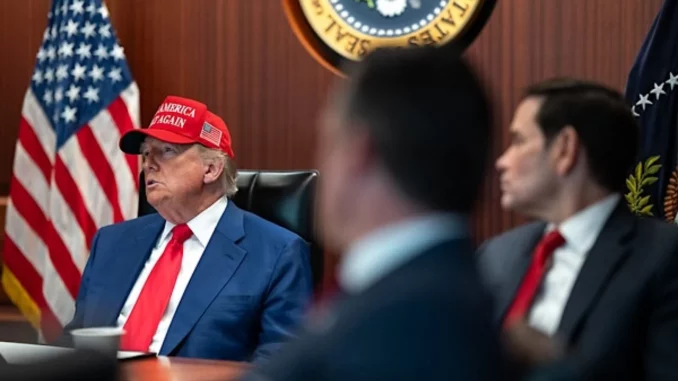
President Donald Trump and his national security team meet in the Situation Room of the White House, Saturday, June 21, 2025. (Official White House photo by Daniel Torok)
| Published June 23, 2025
President gives intriguing nickname to one of America’s most famous anchors
Former President Trump took to Truth Social this week to slam major media outlets over their reporting on U.S. attacks in Iran. In a post, he declared, “The sites that we hit in Iran were totally destroyed… Only the Fake News would say anything different” and went on to single out several “fake news” figures by name—including “Allison Cooper of Fake News CNN,” Brian L. Roberts of Comcast, Jonathan Karl at ABC, and NBC—all of whom he accused of spreading falsehoods and having “ZERO CREDIBILITY” .
So, who is the “fake news giant” he named?
-
He specifically called out CNN’s Anderson Cooper, referring to him mistakenly as “Allison” Cooper, and branded CNN as a “fake news” network.
-
He also took aim at NBC and ABC reporters (Jonathan Karl from ABC, unnamed NBC anchors).
-
Essentially, the primary target here is CNN, with Cooper as the focal point—and that’s the “fake news giant” in this instance .
 Implications
Implications
🔹 1. Media Trust and Public Perception
By naming well-known journalists and executives, Trump is reinforcing his longstanding effort to delegitimize mainstream media. This deepens the already sharp divide between Americans who trust legacy outlets and those who follow alternative platforms.
Implication: Increased public skepticism toward traditional journalism, especially among Trump supporters.
🔹 2. Polarization and Echo Chambers
Accusations like these drive people further into echo chambers—conservative readers may retreat further into pro-Trump outlets, while liberals double down on legacy media.
Implication: National unity and shared facts become harder to achieve when media narratives are completely split.
🔹 3. Influence of Truth Social
Trump’s use of Truth Social to shape news narratives highlights the growing influence of alternative platforms in bypassing mainstream scrutiny.
Implication: Platforms like Truth Social gain legitimacy among certain audiences as trustworthy alternatives to “biased” media.
Trump’s mention of “Allison” Cooper of CNN is actually a reference to Anderson Cooper, the openly homosexual anchor for the Cable News Network.
🔹 4. Impact on Journalists
Calling out specific journalists can lead to harassment or threats. Publicly accusing individuals of deceit can escalate personal risks to reporters, especially in a polarized environment.
Implication: Chilling effect on media, where some journalists may avoid aggressive coverage for fear of retaliation.
🔹 5. 2024 Election Strategy Carryover
Though the 2024 elections are over, this rhetoric shows Trump is keeping his media war alive, likely to preserve his political base and undermine potential legal or narrative threats to his image.
Implication: Continued post-election volatility and media distrust, even into 2025.
💬 Overall Takeaway:
Trump’s Truth Social attack naming CNN and figures like Anderson Cooper as “fake news giants” with “ZERO CREDIBILITY” is more than a personal outburst—it’s a deliberate tactic reinforcing his long-running battle against mainstream media. It aims to discredit critical reporting, deepen loyalty among his supporters, and amplify distrust in legacy news outlets. The broader implications include intensified media polarization, a strengthened echo chamber around alternative platforms like Truth Social, and potential risks to journalistic freedom and safety. Ultimately, this episode reflects how post-presidency, Trump continues to wield narrative power by directly challenging institutional voices.






Be the first to comment